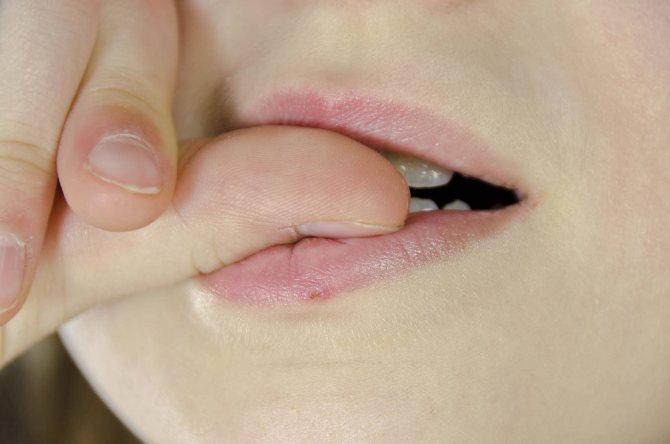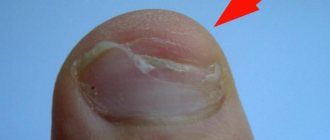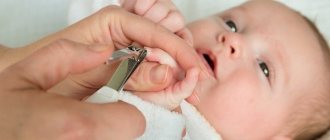Why is the habit of biting nails dangerous and harmful?
The habit of biting fingernails usually appears around the age of 3 years and is considered to be a kind of suppression of aggression, fear or nervousness. In the case of nail biting in stressful situations, this bad habit has a medical term - onychophagia. For some it is just a short-term habit, but for others it is a whole problem that needs to be solved.
It may all start out completely harmless, but over time, this habit in children can pose a health risk in the form of transmission of various infections. Some children carry the habit of nail biting into adolescence and adulthood, when a social problem is added to the health risks.
When you notice that your child is biting his nails, you need to try to take action as early as possible. This bad habit carries a number of unpleasant and destructive properties for the body, namely:
- Under the nail plate there is a great variety of harmful bacteria that can enter the mouth. These bacteria live on children's toys and playgrounds. As a result, problems with the digestive tract may arise, and the child will begin to complain of abdominal pain more often. When biting your nails, there is a risk of getting a rotavirus infection, which is popularly called “dirty hands disease”;
- Bleeding may occur around the nail plate;
- The habit of biting your nails can cause gum disease. Bitten off nails can injure the gums and cause inflammation;
- onychophagia disrupts the normal growth of nails and deforms them;
- there is every chance of causing damage to teeth, especially for young children;
- Biting can damage the skin around the nail plate. This can cause whitlow or infectious paronychia, which in most cases is treated with medication but sometimes requires surgery.

Remember that the reason why children bite their nails has hidden and sometimes serious reasons. This bad habit brings relief, but does not eliminate the cause.
Who bites their nails
According to statistics, people of completely different ages are susceptible to this habit:
- About 50% of children aged 10 to 18 have bitten their nails at some point, and some still do. Most often, nail biting occurs during puberty due to pubertal changes;
- 23% of young people from 18 to 22 years old;
- the remaining adults make up only a small number. Most people quit this harmful activity by age 30;
- Boys bite their nails more often than girls.
Why does a child bite his nails?
Nail biting is a habit that is difficult to break. It’s not easy, because children, like adults, bite their nails without giving it any importance. Research shows that the reasons for this habit may not always be so harmless.
How to brush your teeth correctly? Detailed instructions with Video! Teeth whitening at home is the most effective means. Bad breath - reasons and how to get rid of it...

As a manifestation of stress and tension
The most common reason why a child bites his nails is stressful situations. Sometimes this happens as a result of an unresolved conflict or problem, which causes the child to become angry and angry. In such a situation, it is important to figure out what caused stress in the child and help him get rid of this condition.
Psychological problems
The second possible reason for the emergence of this habit is psychological discomfort. Typically this is difficulty coping with your emotions, especially negative ones such as fear, anxiety, stress, nervousness, anger, sadness. Suppressing these emotions leads children to stress, during which nail biting acts as a kind of safety valve for them. Considering that this harmful activity brings momentary relief in some difficult situations, the strength of the habit gets worse. Children are often unaware of the moment they bite their nails.
Children may bite their nails because of problems at school: from fear of getting an F to being bullied by classmates. Parental, excessive ambition can also act as psychological pressure on a child. Frequent quarrels between parents or divorce in the family can break the child’s psyche and lead to onychophagia.

Out of boredom or due to lack of calcium
When we talk about such a bad habit as nail biting, we are not necessarily talking about accumulated stress or psychological problems. Children often bite their nails to relieve boredom. Sitting in front of the TV, talking on the phone or reading, children’s hands, as a rule, are not occupied with anything else. In most cases, being carried away, children do not notice how they begin to bite their nails.
Sometimes a child bites his nails due to a lack of calcium in the body. Therefore, before sealing your nails with special plasters and smearing them with garlic, try enriching your child’s diet with dairy products - yogurt, cheese, milk. If nothing changes within a month, then the problem is definitely not calcium deficiency.
Matter of habit
According to the American Psychiatric Association, nail biting is considered a disorder. This habit is included in the group of obsessive-compulsive disorders, just like the habit of pulling out hair or biting your lips during nervous tension. Some psychologists believe that children learn this habit from adults, trying to imitate them. Today, it is quite difficult to unlearn this habit, because we are talking about an automatic reaction.

Poor bond between mother and child
The famous psychologist Sigmund Freud suggested that nail biting has a more serious cause from the past. This is an unhealthy and bad mother-child relationship. Freud argued that, along with other symptoms such as frequent chewing or overeating, nail biting is caused by a mother's lack of attention to her child.
Why does a child bite his nails?
Sometimes it is extremely difficult to understand exactly where such an unpleasant problem came from. Experts talk about possible physiological and psychological factors that “turn on” onychophagia.
Physiological factors:
- Condition of the cuticle. In some small children, the skin around their nails constantly “puffs up.” Without waiting for parental help, they try to remove the irritant on their own. This behavior is somewhat reminiscent of the animal reflex of self-care (for example, cats wash themselves with their tongue).
- Physical satisfaction. The child tries to achieve pleasure using all available and inaccessible methods. If he is forbidden, for example, to eat candy or cake, he may switch to his fingers.
- Vitamin and mineral deficiency. The nervous system can function normally only with good nutrition, rich in vitamins and minerals. Vitamins E, B and magnesium-containing foods are especially important for a child; otherwise, high anxiety, nervousness and overwork develop.
- Helminthic infestations. Domestic doctors believe that one of the possible causes of nail biting may be parasites that have settled in the child’s body. Other signs indicate the presence of worms: increased salivation, itching in the rectal area, a sudden change in behavior, and an unreasonable cough.
Psychogenic factors:
- Difficulties with adaptation. For many children, a bad habit arises simultaneously with the beginning of socialization. So, by the age of three, a child begins to attend kindergarten, but if he is a “greenhouse” baby, then even short-term separations become stressful. At the age of seven, the next adaptation begins - he goes to school, which affects his emotional state.
- Family climate. Constant scandals in the family, squabbles between parents, one of them leaving home, shifting the upbringing process to grandmothers - all this is also a stress factor that leads to biting of nail plates.
- Auto-aggression. With such behavior, aggressiveness, due to various circumstances, is directed towards oneself. The child, afraid of being angry with others, begins to harm his own health - for example, biting his nails.
- Model of behavior. Children tend to become “infected” by the actions of other children or adults. If someone in kindergarten, class or at home bites nail plates and hangnails, then the child is able to subconsciously repeat such movements.
- Genetically determined anxiety. A child can bite his nails without an obvious stressogen, only due to an overly excitable nervous system and temperament, which are caused by a hereditary factor. It is interesting that positive and negative events have equally strong stimulating effects.
- The result of early weaning from the mother's breast. Prolonged breastfeeding significantly calms an impressionable child. With sudden or early weaning from the titi, the fingers become a kind of replacement for the mother's nipple or pacifier.
- Perfectionism. The desire to be the best, which is shattered by reality, makes the child perceive his every failure as the “end of the world.” Typically, such situations occur among those parents who place excessive demands on their children. The child, unable to cope with stress, bites his nails.
- Replacing bad habits. Many children distract themselves in one particular way - fiddling with their hair, spinning in place, sucking their fingers, biting their nail plates. Using this method, children calm down, and if you try to wean them from one bad habit, another will begin.
- Boredom. Some kids chew their fingers just because they have nothing to do.
- High loads. Overload at school, simultaneous attendance at several studios, seminars or courses lead to overwork, after which the child struggles with nail-biting neurosis.
- Hobby with TV or computer. Flashing frames, high volume, glare from the screen have a negative impact on the child’s psyche. Trying to calm down, the child sucks his fingers or bites his nails.
We invite you to read: How to learn to smile beautifully? Smile with or without teeth!
Thus, the main provoking factor is increased anxiety and a tendency to stress.
Psychologists believe that by biting his nails, a child activates a kind of pain point that drowns out the stress center.
How to stop a child from biting his nails
There are many ways to stop children from biting their nails. These include special varnishes (can be bought at a pharmacy) that have a very unpleasant taste; you can try wearing gloves at night. But first, try to explain to your child that it is very important to have beautiful and well-groomed hands. Show him your nails, tell him how to care for them. If this doesn't help and you don't know what to do, try other motivation methods:
- little girls can put beautiful, colorful stickers on their nails;
- boys can experiment and paint their nails with a special nail polish that changes color under ultraviolet light;
- tasteless nail polish affects most children instantly and discourages them from biting their fingers;
- Trim your nails daily to avoid chewing. Lend your child a nail file so he can take care of his own nails. Children love to imitate adults, so this activity should appeal to them;
- you can seal your nails, dip them in spices or rub them with garlic, but this method is dangerous because the child may inadvertently rub his eyes with his fingers and then he will have to worry about something else;
- Try to come up with a hobby or exciting activity for your child that will fill all their free time. It is advisable that the game or any other activity uses the hands as much as possible. Modeling, drawing, construction sets are perfect;

- come up with a good fairy tale in which there will be two characters, one neat, with beautiful hands, and the second a slob, whose favorite pastime is biting his nails. The first character has many friends, but no one wants to be friends with the second.
For many children, a girlfriend or friend with beautiful nails, their first crush, helps them as motivation.
Folk remedies
If you still don’t know how to wean your child from a bad habit, try using grandmother’s proven remedies:
- smear your fingers with something bitter or bad-smelling;
- use neem oil. Apply oil (this is an extract of the Indian neem tree) to a cotton swab, wipe your nails and let air dry. This product tastes bitter. In addition, it has antibacterial properties that help eliminate inflammation if the skin around the nail is damaged;
- if you can't find neem oil anywhere, use the ingredient you have at home, such as garlic;
- if the problem is caused by a psychological factor, soothing teas based on chamomile or fennel will help;
- aloe vera. This amazing plant has saved me from cuts, scratches and infections more than once. In addition to its positive qualities, aloe has a bitter taste. Try smearing the cuticle with a piece of the plant;
- An alternative to aloe vera can be wormwood. To do this, pour 100 grams of boiling water over a teaspoon of dry plant and let it brew. Soak a cotton swab in the resulting infusion and lubricate your nails several times a day.
Pharmacy products
In addition to folk methods, there are many remedies to combat bad habits that are freely available in pharmacies:
- special nail polish. This product has an unpleasant taste and has a transparent base, which allows it to be used by both girls and boys;
- patch. An ordinary adhesive plaster, which is sold in a pharmacy, is carefully applied to each finger. This method works well for very young children who will not be able to peel off the patch on their own.
Psychologist's advice
If none of the methods helped the child get rid of this habit, it would be a good idea to seek help from a child psychologist. Experts recommend:
- Do not threaten your child with the consequences of a bad habit. This is a vicious circle: if the child cannot cope, you will begin to worry about the possible consequences, which will only cause stress in the child and a desire to calm down by biting his nails;
- Tell your child that some bad habits (nail biting, nose picking, lip biting) look unsightly and it will be better if he does this while on his own;
- come up with a simple password that you will use to periodically notify your child if he has violated the rules (“nose”, “nails”). Since in most cases, children do not attach importance to this harmful habit and do not notice it;

- Don’t make this habit a universal problem. Frequent visits to doctors and psychologists will only awaken in the child a feeling of inferiority and the realization that something is wrong with him;
- The most important thing is to try not to expose your children to stressful situations. All issues must be resolved in conditions of calm and mutual understanding. Give your child as much free time as possible.
How to get rid of a bad habit in children aged 3 years and older
An older child should be explained that hands become ugly. For many girls, such a conversation has a positive impact. For credibility, you can show them several pictures with infected fingers. It is necessary to tell children in detail that microbes live under the nails; they enter the baby’s body, multiplying there and causing pain in the abdomen. Sometimes this approach to a problem is effective.
Many mothers ask specialists: “If a child bites his nails, how to wean him off?” Scientists advise using therapy through fairy tales in the fight against bad habits. Parents are advised to independently create a story about two characters, one of whom bites his nails, and the other is a clean person. It is worth mentioning that no one wants to communicate with the first hero, since his hands look terrible. Fairy tales always influence the thinking of children, so it is also recommended to mention that as soon as the hero became neat, he had friends.
If a 3-year-old child bites his nails, he needs to be occupied with some kind of interactive game that will keep his hands busy. Construction sets, coloring books or modeling are great.







